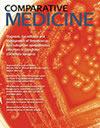Propofol Immersion as a Euthanasia Method for Adult Zebrafish (Danio rerio).
IF 1.1
4区 农林科学
Q2 VETERINARY SCIENCES
引用次数: 1
Abstract
The exponential rise of the zebrafish (Danio rerio) as a model organism in biomedical research has far outstripped our understanding of basic husbandry and welfare for this species. As a case in point, here we investigate the efficacy and welfare impact of different euthanasia methods for zebrafish. Not only is a humane death central to welfare and the 3Rs, but stress during euthanasia can change scientific outcomes. However, the most frequently used methods of euthanasia have multiple shortcomings with regard to animal welfare and human safety. In this study, we propose the use of propofol for immersion euthanasia of adult zebrafish. Propofol has been known to rapidly induce anesthesia in many species, including zebrafish, but its efficacy as a euthanasia agent for zebrafish has not fully been explored. In this study, adult zebrafish were euthanized by immersion on one of 5 different preparations: ice bath, 250 ppm MS222, 600 ppm lidocaine hydrochloride, 100 ppm propofol, or 150 ppm propofol for 20 or 30 min. Display of aversive behaviors, time to loss of righting reflex, time to cessation of opercular movement, and time to recovery after transfer to clean tank water were assessed and recorded. Propofol at both concentrations induced loss of righting reflex and loss of opercular movement more quickly than did MS222 or lidocaine hydrochloride and caused no display of aversive behaviors as seen with ice bath or lidocaine exposure. However, fish exposed to propofol at either concentration for 20 min sometimes recovered, whereas a 30-min exposure was sufficient for euthanasia of all fish tested. These findings suggest that exposure to propofol for a duration of at least 30 min quickly and effectively euthanizes adult zebrafish without compromising end of-life welfare.异丙酚浸泡作为成年斑马鱼的安乐死方法(Danio版本)。
斑马鱼(Danio rerio)作为生物医学研究中的模式生物,其数量呈指数级增长,远远超过了我们对该物种基本饲养和福利的理解。作为一个恰当的例子,我们在这里调查了不同安乐死方法对斑马鱼的疗效和福利影响。人道的死亡不仅是福利和3R的核心,安乐死期间的压力也会改变科学结果。然而,最常用的安乐死方法在动物福利和人类安全方面存在多个缺点。在本研究中,我们建议使用丙泊酚对成年斑马鱼进行浸泡安乐死。众所周知,异丙酚可以在包括斑马鱼在内的许多物种中快速诱导麻醉,但其作为斑马鱼安乐死剂的疗效尚未得到充分探索。在这项研究中,成年斑马鱼通过浸泡在5种不同制剂中的一种上实施安乐死:冰浴、250ppm MS222、600ppm盐酸利多卡因、100ppm丙泊酚或150ppm丙泊酚,持续20或30分钟。评估并记录厌恶行为的表现、翻正反射丧失的时间、顶盖运动停止的时间以及转移到干净水箱水中后恢复的时间。与MS222或盐酸利多卡因相比,两种浓度的异丙酚都能更快地引起翻正反射的丧失和操纵管运动的丧失,并且在冰浴或利多卡因暴露时没有表现出厌恶行为。然而,暴露于任一浓度的丙泊酚20分钟的鱼有时会恢复,而暴露于30分钟就足以对所有受试鱼进行安乐死。这些发现表明,暴露于丙泊酚至少30分钟可以快速有效地对成年斑马鱼实施安乐死,而不会影响其生命末期的福利。
本文章由计算机程序翻译,如有差异,请以英文原文为准。
求助全文
约1分钟内获得全文
求助全文
来源期刊

Comparative medicine
医学-动物学
CiteScore
1.90
自引率
0.00%
发文量
71
审稿时长
6-12 weeks
期刊介绍:
Comparative Medicine (CM), an international journal of comparative and experimental medicine, is the leading English-language publication in the field and is ranked by the Science Citation Index in the upper third of all scientific journals. The mission of CM is to disseminate high-quality, peer-reviewed information that expands biomedical knowledge and promotes human and animal health through the study of laboratory animal disease, animal models of disease, and basic biologic mechanisms related to disease in people and animals.
 求助内容:
求助内容: 应助结果提醒方式:
应助结果提醒方式:


